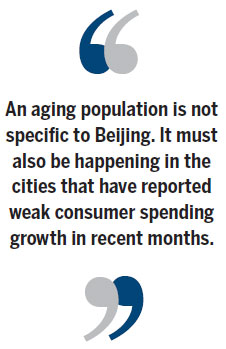Helping the aged also helps the economy
Updated: 2015-05-29 08:21
By Ed Zhang(China Daily Europe)
|
|||||||||||
Officials dazzled by big economic ideas seem unconcerned about care for China's elders
The deadly fire in a nursing home on May 25 in Central China's Henan province, which killed 38 people, is an example of one entrenched imbalance in this country's economy.
On the one hand, China needs, as its leaders have repeatedly said, a major effort to complete its transition to an economy that is mainly driven by consumer spending.
On the other, many services provided to Chinese citizens are marred by problems of many sorts. Their provision is limited, and development, if any, is slow. Initiatives for change are quickly worn out by bureaucratic ineptitude and inaction.

The privately owned nursing home where the fire broke out had been a shabby building, reportedly with grave safety defects.
If this is the case then its proprietors must not have acquired the qualifications to run such an institution and bear the responsibility for many lives.
Illegal and extra-legal services, from kindergartens to old people's nursing homes, are common in China. Some of them are notorious for poor services and exorbitant charges. Disasters, like the fire, are inevitable.
People may naturally ask why, in the world's second-largest economy, all the services needed by its rapidly aging population are so meagerly funded.
Official data show that China's aging population will double from 200 million now to around 400 million by 2050 and will remain one-third of the total population for a prolonged period. There needs to be some major investment in their care in the next 15 years, industry researchers have said. Otherwise society will pay an even higher cost.
But the reality of the nursing service now is that there are only a few decent institutions funded by the government, not enough to meet the rising tide of demand.
Other institutions, mostly shabby, are run by small private investors who are not fully licensed and do not have a long-term commitment.
Large investors, including experienced international companies, are still prevented from joining the market, citing unhelpful rules and practices. One logical explanation is that the most ideal investors may think they are yet to be duly protected, and for the time being, the most sensible thing to do is to stay outside the game.
When the market fails to work, there can only be a few state-owned services for privileged customers and many shoddy black-market-type services for those with the greatest need. This was the pattern of the planned economy in the 1960s and 1970s. Unfortunately it is still visible in some of the most important but most heavily regulated services, such as healthcare, and care of the aging population is only part of it.

In Beijing, where general healthcare may be much better than in most other places in the country, the number of elderly people in need of daily care is about 600,000 out of a total 2.9 million residents aged 60 and above.
But the city's nursing homes have only 80,000 beds, and suffer from a shortage of qualified nurses.
Around half of the nursing homes are located outside the city's Sixth Ring Road. A survey showed that 45 percent of the city's nursing home dwellers complained that their institutions do not provide residential medical services.
An aging population is not specific to Beijing. It must also be happening in the cities that have reported weak consumer spending growth in recent months. There are reports that aging problems are more serious in Shanghai.
However, in contrast with such a huge unmet demand on the everyday level, government officials and their favorite advisers tend to look at other things when they talk about development. They talk about innovation, about somehow and somewhere finding the nation's new growth engine, and about the digital economy.
An official at a university in Shanghai recently said that in 2020 China's yield of data would amount to 2.4 zettabyte, nearly a quarter of the total data in the world. There was also a report that the country's annual spending on research and development was already 1.2 trillion yuan ($193.6 billion; 177.1 billion euros).
But no one seems to care how much data or research funding is used to improve the care and services for the aging population, or for serious economists, to generate real consumer spending.
Shanghai is willing to spend money to compete with Hong Kong for a Disney theme park, to compete with Shenzhen for listing the shares of technology startups, to compete with Beijing for sponsoring research and innovation activities on campuses, and to compete with Las Vegas for hosting consumer electronics shows. But it seems unwilling to be the place where all Chinese patients with age-related symptoms can find the best treatment, or China's best cancer hospitals.
If Shanghai doesn't do this, other cities will - so long as China becomes a more efficient and more competitive market economy. Their economies will be fed by the demand from one-third of the national population.
The author is editor-at-large of China Daily. Contact the writer at edzhang@chinadaily.com.cn
(China Daily European Weekly 05/29/2015 page13)
Today's Top News
British Queen makes references to China in keynote speech
Bayern cashes in on Chinese fans' frenzy for European soccer
German rail giant mulls buying trains from China
Blair to resign as Middle East Quartet envoy
London stock exchange takes steps to include China A shares
China calls for durable settlement of Kosovo issue
China urges BRICS to unite for promoting multi-lateralism
New way to enjoy movie in Berlin
Hot Topics
Lunar probe , China growth forecasts, Emission rules get tougher, China seen through 'colored lens', International board,
Editor's Picks

|

|

|

|

|

|






